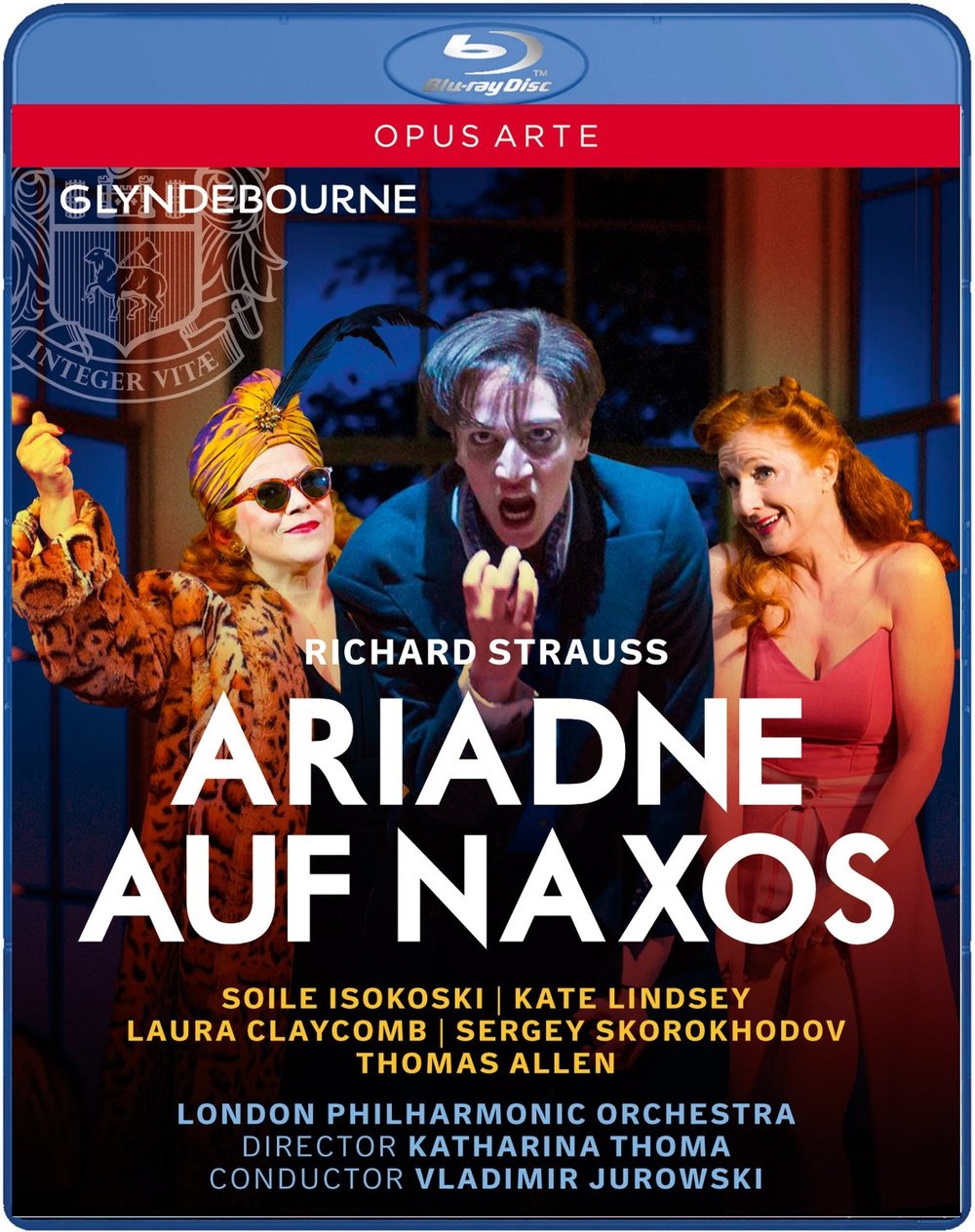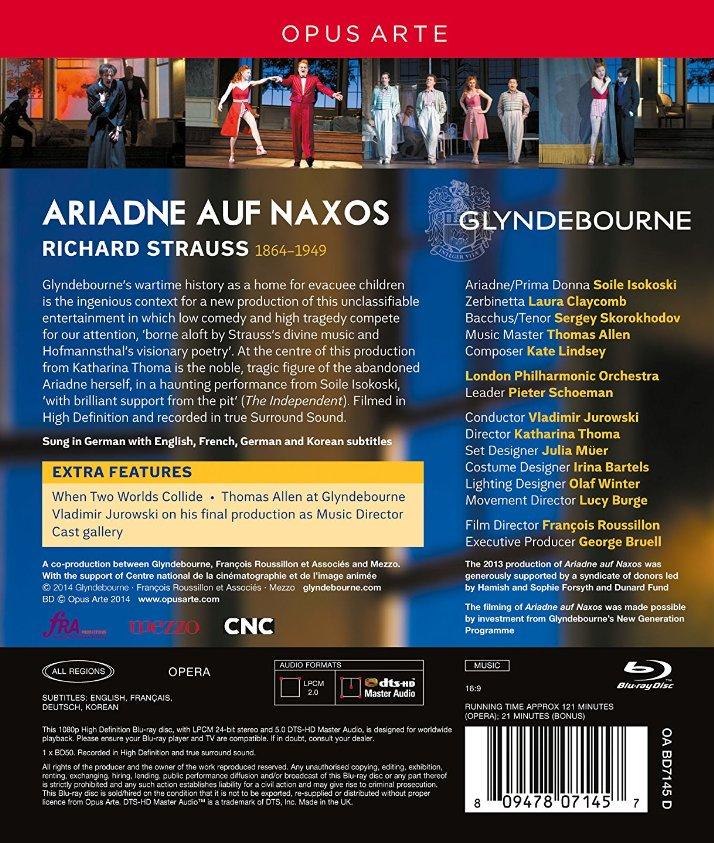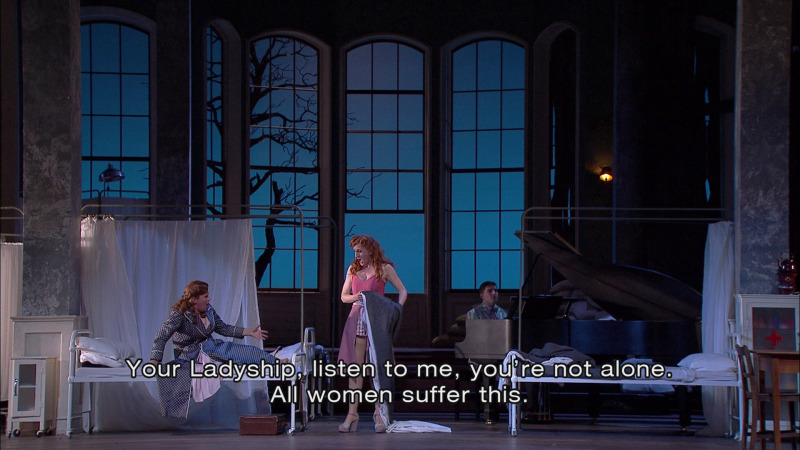

💓 R. Strauss Ariadne auf Naxos opera to libretto by Hugo von Hofmannsthal. Directed 2013 by Katharina Thoma at Glyndebourne. Prologue stars are Thomas Allen (Music Master), William Relton (The Major-Domo), Frederick Long (Lackey), Stuart Jackson (Officer), Kate Lindsey (Composer), Sergey Skorokhodov (Tenor), Michael Wallace (Wig Maker), Laura Claycomb (Zerbinetta), Soile Isokoski (Prima Donna), Wolfgang Ablinger-Sperrhacke (Dancing Master), Dmitri Vargin, James Kryshak, Torben Jürgens, and Andrew Stenson (Four Comedians), and Gary Mathewman at piano. Opera stars are Ana Maria Labin (Naiad), Adriana Di Paola (Dryad), Gabriela Iştoc (Echo), Soile Isokoski (Adiana), Laura Claycomb (Zerbinetta), Dmitri Vargin (Harlequin), James Kryshak (Scaramuccio), Torben Jürgens (Truffaldino), Andrew Stenson (Brighella), and Sergey Skorokhodov (Bacchus). Additional performers are Fiona Alsop, Gini Comyns, Philip Dew, Kym Giggins, Darren Harker, Gowan Hewlett, Mike Howell, Rebecca MacMillan, Patrick O'Hare, Philip Ticehurst, and Matthew Tweddle. Vladimir Jurowski conducts the London Philharmonic Orchestra (Leader Pieter Schoeman) with 31 musicians. Set design by Julia Müer; costume design by Irina Bartels; lighting design by Olaf Winter; movement direction by Lucy Burge. Directed for TV by François Roussillon; Executive Producer was George Bruell; Sound Supervisor was Jen Chatauret; Music Producer was Sébastian Chonion. Sung in German. Released 2014, disc has 5.1 dts-HD Master Audio sound. Grade: A+
Ariadne auf Naxos is a study in reconciling the opposites of probity vs. pleasure, high art vs. entertainment, and ancient drama vs. modern comedy. The theme of bifurcation is expressed in two operas in one frame with libretto and music making equal contributions. With all these abstract considerations involved, it's easy for this work to dissolve into incoherent, boring nonsense. The director has to find a setting that will allow a coherent telling of the story. Thank you, Katherina Thoma for placing your Glyndebourne Ariadne auf Naxos in, well, Glyndebourne. (I assume [don't know] the stage set was inspired by an actual room in the Glyndebourne Manor.)
The Lord of Glyndebourne would, of course, be John Christie. The time would be the middle of the Phony War; nothing wrong with having friends over for some entertainment and a good time to commission an opera seria. Here we see the Music Master (Sir Thomas Allen) whose star student wrote the new work. He's just learned there will be other, competing entertainment as well:
Now we meet Mr. C, the Composer (Kate Lindsey in trousers), who is, it's obvious to me, the alter ego of Richard Strauss. Mr. C lives in a perpetual state of writing and singing gorgeous music; here's he's bombs away writing what winds up as a quote from the Zerlina music in Don Giovanni:
Now the Music Master and Mr. C meet the other performers who will be on the program:
A better shot of Zerbinetta (Laura Claycomb), the Dancing Master in red (Wolfgang Ablinger-Sperrhacke), and the male quartet of comedians Dmitri Vargin, James Kryshak, Torben Jürgens, and Andrew Stenson. (Long, long ago they were called Harlequin, etc.):
The Prima Donna (Soile Isokoski) and Mr. C are disgusted by the sight of such a floozy in the manor:
There follows much ado about which show should go first after dinner. But Mr. Christie moots this by ordering that the opera and the vaudeville show be performed together:
The show must go on. Mr. C describes Ariadne, his opera heroine:
But Zerbinetta understands Ariadne better than Mr. C:
Zerbinetta knows how to appeal to men. She starts singing like Puccini as Hofmannsthal sends cliché after cliché running over the cliff like lemmings:
Now Mr. C sees things differently. Where did Hofmannsthal find the inspiration for this? Kant? Hegel? Schopenhauer?
The Phony War is over as the Luftwaffe carpet-bombs Glyndebourne. The guests man a bucket brigade. Mr. C's premiere of Ariadne is cancelled till further notice, and this is the end of the first opera (or Prologue):
The guests save Glyndebourne from complete destruction, and the manor is turned into a field hospital. The Prima Donna and Mr. C were injured and are still there. (In fact Glyndebourne served in the war as a refuge for evacuated children.) Now the Prima Donna gets her role as Ariadne in Ariadne auf Naxos and we will see how on opera seria and a vaudeville show can be simultaneously performed. Ariadne, abandoned by her lover, doesn't know if she is dead or alive. Mr. C has lost his voice and can only hover about. (Mr. C is not a character in the Hofmannsthal libretto of the second opera---he was added here by Director Thoma so he can get more real-life experience.)
We come to the first lines in Ariadne auf Naxos that most opera-goers can remember. After all the laughter of the First Opera, we suddenly encounter: "There is a realm where all is pure. And it has this name: the Realm of the Dead." You will recall the classical myth where Ariadne abandoned her own people and ran away with Theseus, who then in turn abandoned her on the island of Naxos. For Ariadne there are only two options: reunion with Theseus, or death. Ariadne's famous lines are shown below in German:
But suddenly Zerbinetta and her comedians are the ones who come back. They weren't hurt by the Blitz, but they are on tour cheering up the injured. And here we have another improbably famous line: "Grandly empowered Princess" or "Your most royal Ladyship."
And here's where all the opposites embedded in this work meet to achieve critical mass. Zerbinetta tries to cheer up Ariadne:
Once Zerbinetta gets started on the subject of men, she gets excited and can't stop:
To singing of what Henry Simon calls "pure nymphomaniacal coloratura" Zerbinetta also shows herself to be a pure nymphomaniacal exhibitionist. The head nurse rings the alarm bell:
Subdued, Zerbinetta can only recall the men and her string-of-pearls orgasms of the past:
You will recall that Ariadne in the myth is eventually discovered on Naxos by the God Bacchus, who falls for her because of her purity and patience. Here the nurses learn from a tabloid that a pilot named Bacchus has been injured and is being sent to the Glyndebourne field hospital!
Soon Ariadne and Bacchus get together as ordained by Fate:
But Zerbinetta gets the last word:
This production is both unbelievably funny and exceedingly well made. SQ, PQ, and video content as directed by François Roussillon are impeccable. The singing of the cast and playing of the chamber-size orchestra are equally fine. The screenshots give ample proof of the brilliance of the personal direction and acting.
But even grander than all this is the way Katharina Thoma molds a unified and comprehensible drama out of the many factions tumbled into the libretto. And now I see who the real star of this opera is: Zerbinetta auf Naxos. She is the one whose brilliance ties the Prologue and the Opera together. She's also the spear wielded by Hoffmansthal and Strauss to prod all the high and mighty people in the show into their proper places. In terms of literature, this is a satire, but there's nothing mean-spirited about it. It's a sweet and comfortable satire because of the persons Hofmannsthal and Strauss chose for their targets: themselves.
Zerbinetta is more than just a soprano singing improbably high stuff. She represents the antidote to all cant; and this takes huge acting talent, which Laura Claycomb has in riotous profusion. To fully understand how canny Claycomb is, buy this Aridane auf Naxos and the HDVD of The Rake's Progress, in which Claycomb plays the role of Anne Truelove. As Truelove, Claycomb shows you all the shock, pain, and grief of a decent, honest girl who is cast aside by the man she truly loves and will be faithful to until his death. But Truelove doesn't become a Goddess after that — she goes back to the great plains to live out her barren life as a spinster.
Opera News picked this Ariadne auf Naxos as its "Critic's Choice Video" for November 2014 (page 56). Back to business: mark up another "A+" for Glyndebourne.
Here are some trailers:
OR


































